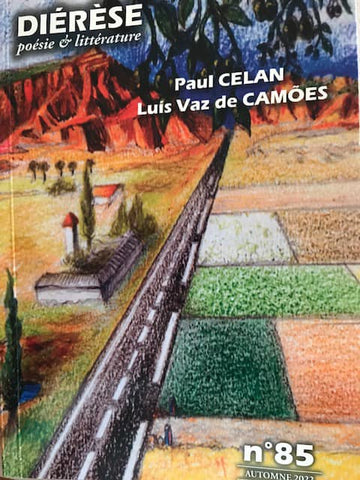Living in a glass house in the magazine “Diérèse” by Sabine Dewulf


"In this title, the infinitive implies a sort of interior program. The theme of the "glass house" evokes a form of solid incarnation, while the material, linked to transparency, directs us towards a value, authenticity, or even an opening to the meaning of existence. The quotation in the spotlight, two verses from Marina Tsvetaïeva, adds to that of the house the figure of the trees, as well as the idea of a solitude within heal: “Two trees seek to come together”.
The very first verse is marked with the seal of negation and pain: “I have not found a tower to inhabit my madness.” Hermetic and opaque, this tower seems the opposite of the “glass house”. The words express without disguise, à la Prévert, the absurdity of this solitude: "In your house where no one comes, there are two chairs." The house emerges against the backdrop of absence, it is the object of a nostalgic quest: “I search in the wind for your house / the one that was mine too.” Russian terms ("mujik", "makhorka") suggest an exile or a past lived abroad. In fact, the current house has become "unlivable" and the adjective at the end of the line accentuates the tragedy of the situation.
It is to the poem that the mission of building this glass house is assigned: “In the word / look for your garden / with its fresh paths”. The text seeks to resurrect "an abandoned residence", also called "my friends' room". He would like to deploy a breathable space (too cramped ) in a reality woven of false pretenses, marked by confinement within oneself: "the happiness that we had invented / bound hand and foot", the “prisoner” “at the bottom of a cellar”; “a wall of stone” which represents “the impossible”.

Inhabiting transparency implies deep listening: “a simple trill / delivers the key to all kingdoms”. It is about “becoming silence” to hear “the water trembling under the bridges” and to ward off the deep, archaic “anxiety”, that which “returns from the depths of the ages”. The word navigates between opposites to repair the tear: "There are only two certainties: the finite, the infinite." The form is free and flexible, it oscillates between verse, verse and prose text. The poem progresses by its own movement, the house is built gradually. The poet intends to clarify "the four walls of reason" by proclaiming: "There is a place where we will no longer be / separated."
What exactly does the symbolism of glass correspond to? The poet responds to us with a desire for frankness, for self-sacrifice: “Living in a glass house / in the transparency of every gesture”. The glass also reflects “sky and moving earth”. The quest is first of all that of light and the outside, in its various forms: "rain", "bright air" which has "the edge of a knife". Such clarity opens up the space for encounters: a “young girl” is expected, invites herself into the poem, who has “the gravity of deep waters, the tinkling of rain on a slate roof”. The glass house is opposed to the "black house" of the night as well as to the "burning house", full of "ashes" and "dust". She leaves everyone the possibility of shaping their own path: “we must live well // without being given a key”.
The subject of this book does not only deliver from the intimate, it tends towards the universal: "But who comes there? [...] Is this the king of this world? The one, the only?" A king "of love" is invited to come forward, in the awareness of the interdependence of beings and things: "fire, ashes", "the possible, the impossible"... Thus offering himself hope of true transparency, where the bird and the tree combine to help us “re-enchant / our uprooting”.
Sabine Dewulf
Article published in the journal Diérèse in October 2022.
Buy the book online: Living in a glass house – Éditions Exopotamie
